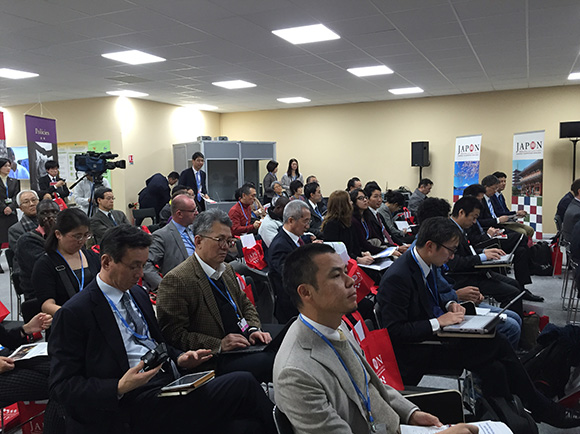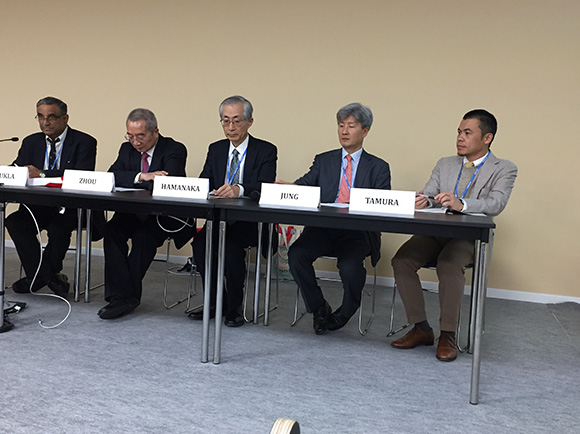Side Event on Tripartite Climate Policy Dialogue among Japan, China, and Korea -Research and Policy Cooperation in Asia to Achieve the 2 Degrees Target-
Institute for Global Environmental Strategies (IGES); Energy Research Institute, China; Institute for Global Sustainability, Republic of Korea
Outline
Japan, China and Korea collectively account for approx. 30% of global GHG emissions, and have significant technological and financial capacity to reduce these emissions.
Three leading research institutes of the countries (IGES, IGE, ERI) argue the importance of collaborative research on climate policy and the necessity to harmonize national climate policies among Japan, China, and Korea in order to achieve the 2 degrees target in Asia.
In this event, we will discuss the 2 degrees scenario in Asia and policies and financial mechanism necessary to achieve it with a focus put on the establishment of an integrated carbon market and the phase out of coal power.
Program
-
- Opening Remarks 1
- Dr. Shamshad Akhtar, Executive Secretary, UNESCAP
-
- Presentation 1
- Dr. Tae-yong Jung, Professor and Deputy Executive Director, Yonsei University, ROK
-
- Opening Remarks 2
- Prof. Seung-soo Han, Former Prime Minister, ROK
-
- Guest Remarks
- Mr. Masaaki Kobayashi, Vice Minister for Global Environment Affairs, Ministry of the Environment, Japan
-
- Presentation 2
- Dr. Kentaro Tamura, Area Leader, Climate and Energy Area, IGES, Japan
-
- Panel Discussion
-
Dr. Zhou Dadi, Former Director General, ERI
Prof. Hironori Hamanaka, Chair of the Board of Directors, IGES, Japan
Dr. Tae-yong Jung, Professor and Deputy Executive Director, Yonsei University, ROK
Dr. Kentaro Tamura, Area Leader, Climate and Energy Area, IGES, Japan- [Chair and Moderator]
- Prof. P. R. Shukla, Co-chair, IPCC WGIII
Dr. Shuzo Nishioka, Senior Research Advisor, IGES, Japan
Summary
Opening Remarks
Dr Shamshad Akhtar, Executive Secretary, UNESCAP
It is important to have policy and research dialogue among Japan, China and Korea in order to provide stronger contribution to stabilizing the climate systems. The regional alliance among the three economies is critical for further GHG emissions reductions in the region and beyond. Economic impacts (to be) caused by climate change is significant and beyond borders, for which research collaboration among countries is inevitable and immensely valuable. The benefits which can be obtained from information and knowledge sharing, joint research and its findings will also go beyond the countries’ boarders. Some of many important topics for this research collaboration would be on: 1) transboundary implication of climate change; 2) adaptation; and 3) implementing 2030 development agenda. Exploring the possibility to establish a common carbon pricing scheme is also important. ESCAP would like to continue supporting this important tripartite cooperation.
Presentation
Dr. Tae-yong Jung, Professor and Deputy Executive Director, Yonsei University, ROK
How can we establish a regional emissions trading scheme which gives a strong signal for carbon pricing. In addition, how can we scale up a current national trading scheme to a regional, as well as to develop national and local mitigation activities in order to reduce GHGs emissions? Generating co-benefits both for global climate and local environment is important. Translating research findings into such words that can be easy to understand for decision makers is a big challenge and is critical to promote change. We need a strong and stable climate finance mechanism, be it bilateral or multi-lateral, as well. It is also of immense importance to work together not just between us, the three countries, but among all the ASEAN members for establishing sustainable and low carbon Asia and beyond.
Prof. Seung-soo Hang, Former Prime Minister, ROK
Korea, China and Japan accounts for the 1/5 global GDP. The three countries are ranked in the global top 10 GHG emissions countries (China #1, Japan #5, Korea #7). Northeast Asia is indeed a carbon intensive region. We need to address the importance of SDGs, in particular SDGs 13 which is dedicated to climate change. We also need to pay strong attention to carbon budget as it will be used up very quickly with the current emission levels. In this regard, transboundary and collaborative research on low carbon future is what we need right now and it is very much expected that this collaboration will contribute also to stronger policy collaboration among the three countries in various agenda.
Mr. Masaaki Kobayashi, Vice Minister of the Environment of Japan
The Government of Japan welcomes the collaborative research among the leading research institutes from Japan, China and Korea. Joint research to identify the means to keep temperature increase to below 2 degrees Celsius comes with a great importance. In addition to mitigation, adaptation is important when addressing climate change. Japan has just adopted its national adaptation plan. The Government of Japan wishes the best for these three institutes to work closely to contribute to a more sustainable Asia and beyond.
Dr. Kentaro Tamura, Area Leader of IGES
Decarbonising energy/power sector is crucially important in Japan, China and Korea. The three countries can play a pivotal role in addressing the coal issue in climate change both domestically and internationally. Therefore, shifting away from coal with an aim to consider its complete phase out will be one of the most important topics for this joint research initiative. Indeed, reducing coal consumption has already started to become a trend at the global level as observed in the new international rules on energy investment established by OECD, and in the recent China and US presidential decree.
Panel discussion
Dr. Zhou Dadi, Former Director General of ERI
Policy dialogue between the three countries is very important since 1) Although Asia is the region with the biggest economic activities in the world, it does not yet play a leading role in addressing climate change. This regional dialogue and joint research will enrich regional debates and thus raise the regional profile in the global climate policy arena; and 2) China aims to become a leading country of innovation for transitioning to a low-carbon society and a close cooperation among the three countries is critical to develop innovative green technologies. Improving energy efficiency is not enough to tackle climate change, but what we really need is a true innovation. International dialogue and joint research can very much serve these purposes.
Dr. Tae-yong Jung
This joint research and policy dialogue aims to make fruitful results not only for the three countries themselves, but for Asia and global society. There were only four lead authors for the 1st IPCC report, but now quite a good number of Asian experts are involving in the on-going IPCC processes. Research on regional emission trading is a topic with great interest for many stakeholders, and the topic itself is closely related in nature to Dr. Tamura’s suggestion on the importance of research that addresses coal phase out.
Prof. Hironori Hamanaka, Chair of the Board of Directors of IGES
In addition to the important agenda pointed out by the previous speakers, establishing a common guideline for information disclosure would be a great topic for this joint research initiative.
Q&A
A colleague from Malaysia pointed out that coal consumption is increasing due to the increasing energy/electricity demand and asked what role that CCS and other technological developments can play. The panelists answered that it is important to bridge development needs and climate targets while arguing that it is critical to aim for carbon neutral in the long run. A comment was made from the floor that vast opportunities can be generated if we shift to low-carbon or zero-carbon growth.
Key Messages
P. R. Shukla, Co-chair of the IPCC WGIII said at the closing remarks, “Transition is necessary and it is happening. A lot of low carbon technologies are already available and waiting for us to invent on them. Joint research can surely bridge technology needs and this investment challenge. From this aspect, cost effectiveness, risk management including financial risk should be also addressed in a joint manner. This international research team is expected to work closely together and aim for high, then come back to audience with research results in the next COP”.
Photograph
Reporters
Takashi Otsuka, Masahiro Suzuki, Tomoko Ishikawa, Institute for Global Environmental Strategies (IGES)






